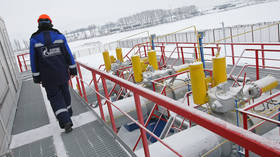[
Country’s foreign minister Peter Szijjarto has also warned Kiev’s actions could further destabilize the European energy market
Hungarian Foreign Minister Peter Szijjarto has blamed rising natural gas prices in the EU on what he described as “artificially reduced supply.” In a Facebook post on Tuesday, he attributed the increases to EU sanctions and to Ukraine’s recent decision to halt Russian gas transit to Central Europe.
Ukraine refused to extend its pipeline transit contract with Russia’s Gazprom beyond the end of 2024, cutting off the flow of natural gas from Russia to Romania, Poland, Hungary, Slovakia, Austria, Italy, and Moldova. Its decision caused EU gas prices to spike to €50 per megawatt hour, a figure unseen since October 2023.
Szijjarto emphasized that the higher gas prices have undermined the bloc’s competitiveness and has disproportionately burdened its citizens. “Ukraine is trying to join the EU as a candidate, it has once again put the European economy in a more difficult position with its latest decision,” he pointed out.
He also criticized Kiev for breaching its EU Association Agreement by stopping transit shipments. “Ukraine’s decision to stop transit shipments will lead to further price increases and create new competitiveness challenges for Central Europe and the European Union as a whole,” Szijjarto warned.
“Since the end of the Ukrainian transit route in mid-December, natural gas prices in Europe have risen by 20%,” he said.
Budapest’s efforts to diversify gas supply routes have nonetheless secured the country’s energy needs, despite price increases, the minister said, explaining that the country’s investment in the Turkish Stream pipeline, which bypasses Ukraine, was critical in ensuring stable supply.
“If we had succumbed to the ‘friendly’ pressure against the Turkish Stream years ago, we would now be in a very, very difficult position as a landlocked country,” Szijjarto said.
Gazprom, once the EU’s main gas provider, dramatically reduced its exports to the bloc in 2022, following the imposition of sanctions against Russia and the sabotage of the undersea Nord Stream pipelines.
Russia has officially stopped supplying gas to the EU through Ukraine as of January 1, after months-long negotiations to extend the transit deal with Kiev fell through. Moscow repeatedly said it was willing to extend the transit deal and continue deliveries through Ukraine beyond 2024. Russian President Vladimir Putin accused Kiev of “punishing” the EU with its decision, which he said would lead to higher energy prices. At his annual press conference on December 19, Putin stated that the halt to this gas transit, however, would have little impact on Russia.
You can share this story on social media:




